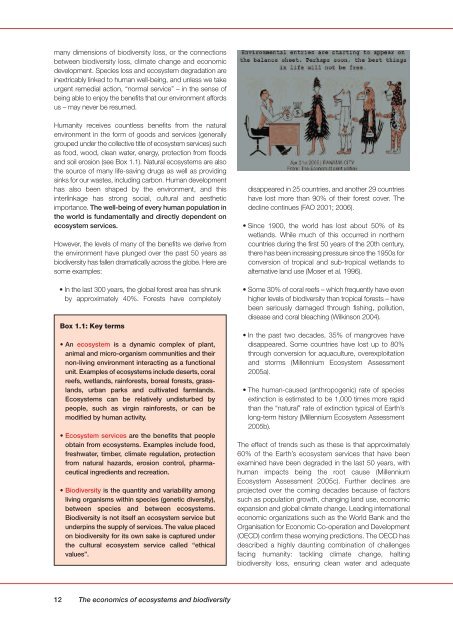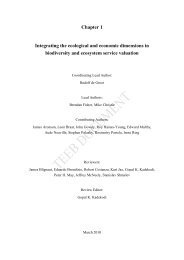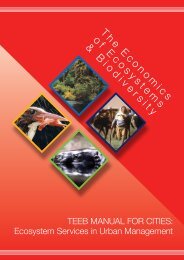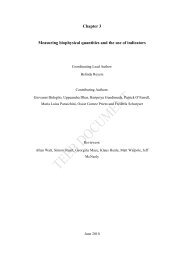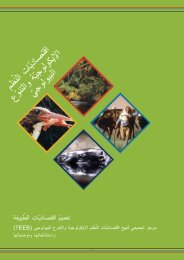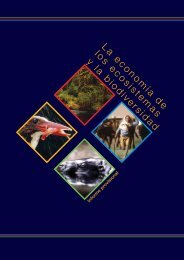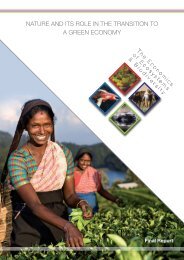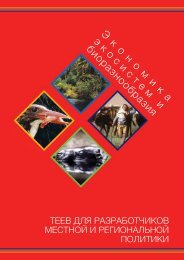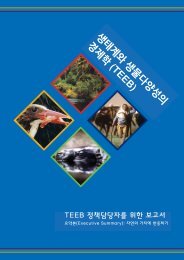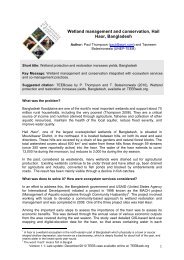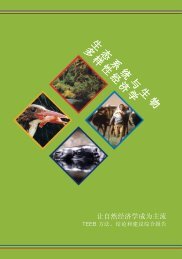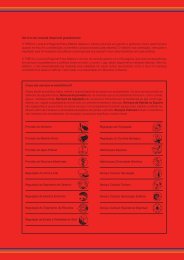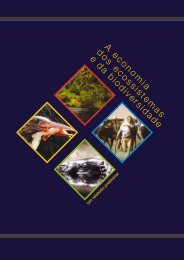Interim Report - TEEB
Interim Report - TEEB
Interim Report - TEEB
You also want an ePaper? Increase the reach of your titles
YUMPU automatically turns print PDFs into web optimized ePapers that Google loves.
many dimensions of biodiversity loss, or the connections<br />
between biodiversity loss, climate change and economic<br />
development. Species loss and ecosystem degradation are<br />
inextricably linked to human well-being, and unless we take<br />
urgent remedial action, “normal service” – in the sense of<br />
being able to enjoy the benefits that our environment affords<br />
us – may never be resumed.<br />
Humanity receives countless benefits from the natural<br />
environment in the form of goods and services (generally<br />
grouped under the collective title of ecosystem services) such<br />
as food, wood, clean water, energy, protection from floods<br />
and soil erosion (see Box 1.1). Natural ecosystems are also<br />
the source of many life-saving drugs as well as providing<br />
sinks for our wastes, including carbon. Human development<br />
has also been shaped by the environment, and this<br />
interlinkage has strong social, cultural and aesthetic<br />
importance. The well-being of every human population in<br />
the world is fundamentally and directly dependent on<br />
ecosystem services.<br />
However, the levels of many of the benefits we derive from<br />
the environment have plunged over the past 50 years as<br />
biodiversity has fallen dramatically across the globe. Here are<br />
some examples:<br />
• In the last 300 years, the global forest area has shrunk<br />
by approximately 40%. Forests have completely<br />
Box 1.1: Key terms<br />
• An ecosystem is a dynamic complex of plant,<br />
animal and micro-organism communities and their<br />
non-living environment interacting as a functional<br />
unit. Examples of ecosystems include deserts, coral<br />
reefs, wetlands, rainforests, boreal forests, grasslands,<br />
urban parks and cultivated farmlands.<br />
Ecosystems can be relatively undisturbed by<br />
people, such as virgin rainforests, or can be<br />
modified by human activity.<br />
• Ecosystem services are the benefits that people<br />
obtain from ecosystems. Examples include food,<br />
freshwater, timber, climate regulation, protection<br />
from natural hazards, erosion control, pharmaceutical<br />
ingredients and recreation.<br />
• Biodiversity is the quantity and variability among<br />
living organisms within species (genetic diversity),<br />
between species and between ecosystems.<br />
Biodiversity is not itself an ecosystem service but<br />
underpins the supply of services. The value placed<br />
on biodiversity for its own sake is captured under<br />
the cultural ecosystem service called “ethical<br />
values”.<br />
disappeared in 25 countries, and another 29 countries<br />
have lost more than 90% of their forest cover. The<br />
decline continues (FAO 2001; 2006).<br />
• Since 1900, the world has lost about 50% of its<br />
wetlands. While much of this occurred in northern<br />
countries during the first 50 years of the 20th century,<br />
there has been increasing pressure since the 1950s for<br />
conversion of tropical and sub-tropical wetlands to<br />
alternative land use (Moser et al. 1996).<br />
• Some 30% of coral reefs – which frequently have even<br />
higher levels of biodiversity than tropical forests – have<br />
been seriously damaged through fishing, pollution,<br />
disease and coral bleaching (Wilkinson 2004).<br />
• In the past two decades, 35% of mangroves have<br />
disappeared. Some countries have lost up to 80%<br />
through conversion for aquaculture, overexploitation<br />
and storms (Millennium Ecosystem Assessment<br />
2005a).<br />
• The human-caused (anthropogenic) rate of species<br />
extinction is estimated to be 1,000 times more rapid<br />
than the “natural” rate of extinction typical of Earth’s<br />
long-term history (Millennium Ecosystem Assessment<br />
2005b).<br />
The effect of trends such as these is that approximately<br />
60% of the Earth’s ecosystem services that have been<br />
examined have been degraded in the last 50 years, with<br />
human impacts being the root cause (Millennium<br />
Ecosystem Assessment 2005c). Further declines are<br />
projected over the coming decades because of factors<br />
such as population growth, changing land use, economic<br />
expansion and global climate change. Leading international<br />
economic organizations such as the World Bank and the<br />
Organisation for Economic Co-operation and Development<br />
(OECD) confirm these worrying predictions. The OECD has<br />
described a highly daunting combination of challenges<br />
facing humanity: tackling climate change, halting<br />
biodiversity loss, ensuring clean water and adequate<br />
12 The economics of ecosystems and biodiversity


